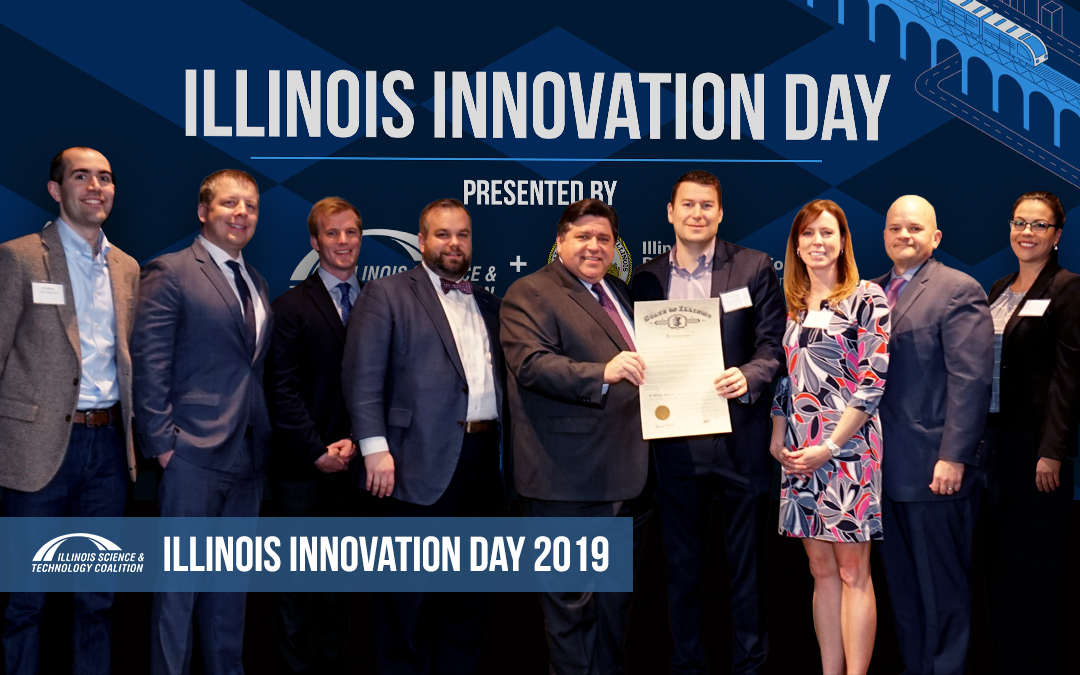Last week, members of Illinois’ innovation community gathered in Springfield as Governor J.B. Pritzker proclaimed April 12, 2019 “Innovation Day” in the state of Illinois. The event, hosted by the Illinois Science & Technology Coalition (ISTC) and the Illinois Department of Commerce and Economic Opportunity (DCEO), included addresses from Governor Pritzker; Mark Harris, President & CEO, ISTC; and Ron Guerrier, CIO and Secretary of Innovation & Technology, State of Illinois.
Innovation Day also included a panel of community leaders discussing themes and trends in Illinois’ innovation ecosystem. Panel participants included moderator Laura Frerichs, Director of the University of Illinois Research Park; Benjamin Hernandez, CEO & Co-founder of NuMat Technologies; Beth Ladd, Analytics R&D Manager at CAT Digital; and Starr Marcello, Executive Director of the Polsky Center at the University of Chicago. The day concluded with roundtable discussions on place-based innovation and incubation activity; cluster strategies; and STEM talent pipeline development.
Organizations partnering with ISTC and DCEO include the Chicagoland Chamber of Commerce, Clean Energy Trust (CET), the Illinois Biotechnology Innovation Organization (iBIO), the Illinois Chamber of Commerce, the Illinois Manufacturing Association (IMA), the Illinois Technology Association (ITA), and the Illinois Venture Capital Association (IVCA).

Innovation Day Highlights
Governor J.B. Pritzker led of the event, emphasizing the important role that the science and innovation community plays in Illinois’ economy. Read the Governor’s full remarks here.
“From university leaders, startup founders, and regional economic development groups to those running incubation spaces, the venture community, industry executives, and civic and non-profit leaders—those gathered here today and those across our state—drive Illinois’ economy forward.” – Gov. J.B. Pritzker
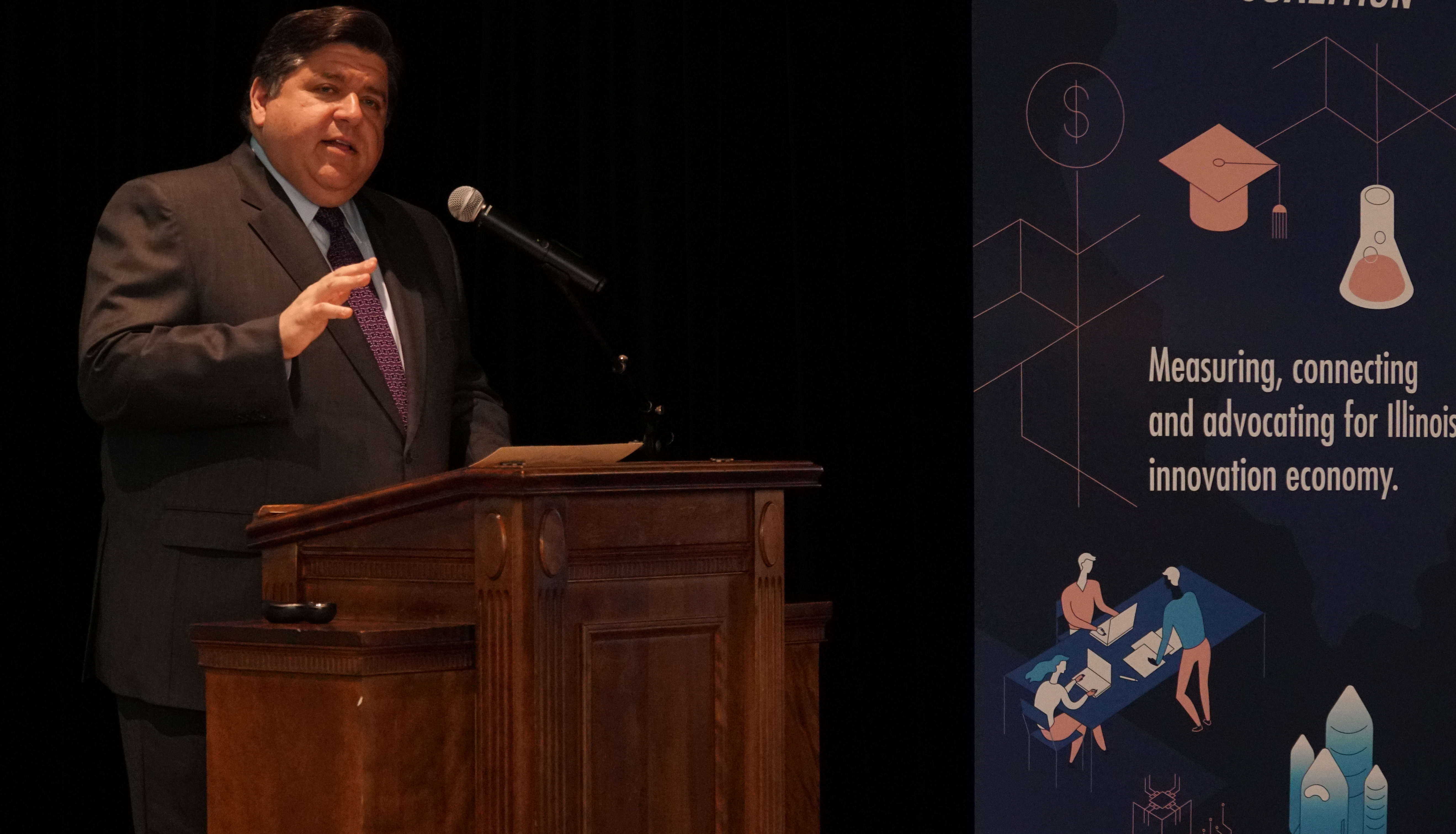
Governor J.B. Pritzker speaks about the importance of science and technology in Illinois’ economy, prior to declaring April 12th “Innovation Day” in Illinois.
Mark Harris, President & CEO of ISTC, then gave an overview of Illinois’ innovation economy, including new data from the 2019 University Entrepreneurship issue of the Illinois Innovation Index. Read the full Index here.
“Over the past five years, students and faculty at Illinois’ universities have founded nearly 1,000 startups, raising $1.24 billion in funding, and creating 3,000 new jobs.” – Mark Harris
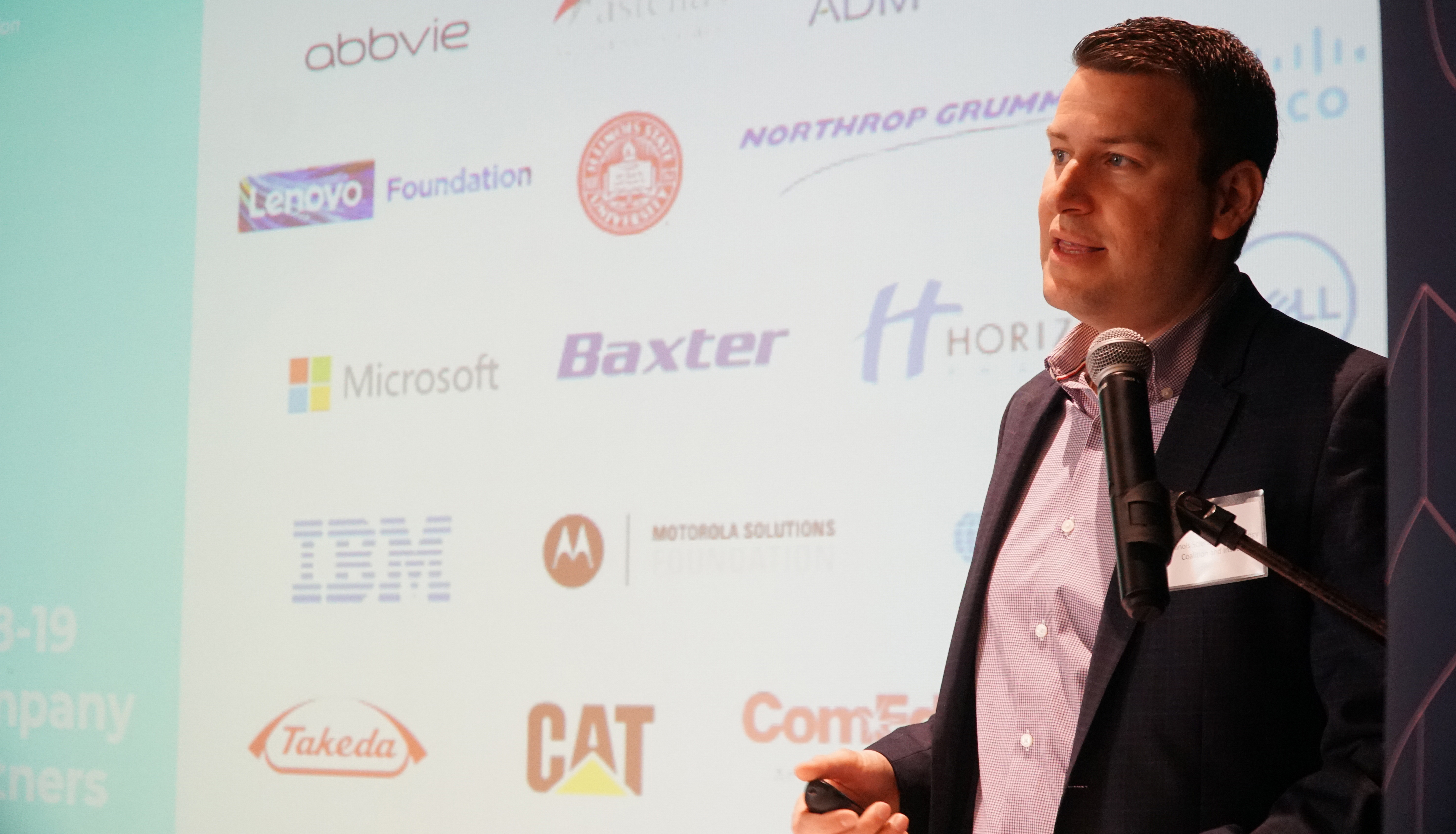
ISTC President & CEO Mark Harris provides an overview of Illinois’ innovation ecosystem.
Ron Guerrier, State of Illinois CIO and Secretary of Innovation & Technology, talked about empowering Illinoisans through technology.
“Question why we do things, and innovate to make change happen.” – Ron Guerrier
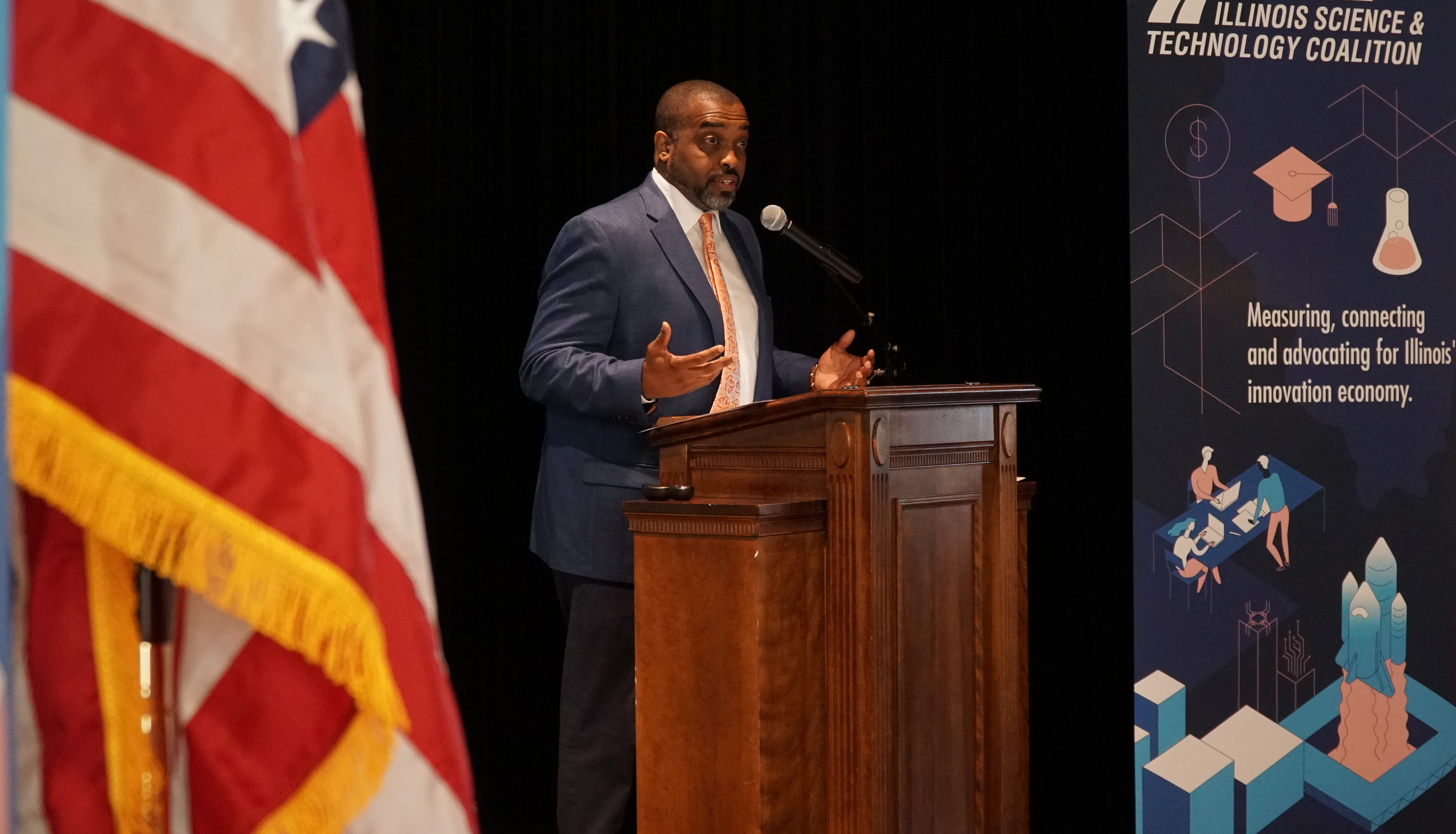
State of Illinois CIO and Secretary of Innovation & Technology, Ron Guerrier speaks about the importance of innovation.
Discussion Insights
Panel Discussion Takeaways
- It’s important for universities to include their surrounding communities with programming and support to drive innovation. This is important serendipity that occurs in startup ecosystems with connections to capital, customers, mentors, and talent.
- Having space for entrepreneurs to utilize once they age out of incubator or accelerator programs is important. Often growing startups want to stay, but do not have offices, labs, etc. This includes wet lab space, which is currently extremely limited in Illinois.
- To further drive growth and access to capital in the state, it’s critical successful entrepreneurs keep dollars local and re-invest in new startups within the ecosystem.
- We need to think about SBIR funding as a tool to catalyze startup growth, not as an end goal for startups.
- Caterpillar has located on college campuses—the Caterpillar Data Innovation Lab at UIUC and CAT Lab at UIC—to access critical STEM talent produced by these universities. These partnerships are mutually beneficial – in exchange for access to top-level talent, CAT provides students with invaluable experiential learning opportunities, and post-graduation employment opportunities.
- The state needs to think beyond funding for physical space and build program capacity that is needed to grow the innovation economy by expanding services to entrepreneurs and lowering the bar to entry for new founders.
- mHUB supports students who develop intellectual property on campus but need to relocate to prototype. A strong innovation ecosystem capable of facilitating handoffs between university campuses and community innovation spaces is critical to keeping companies and talent in the state.
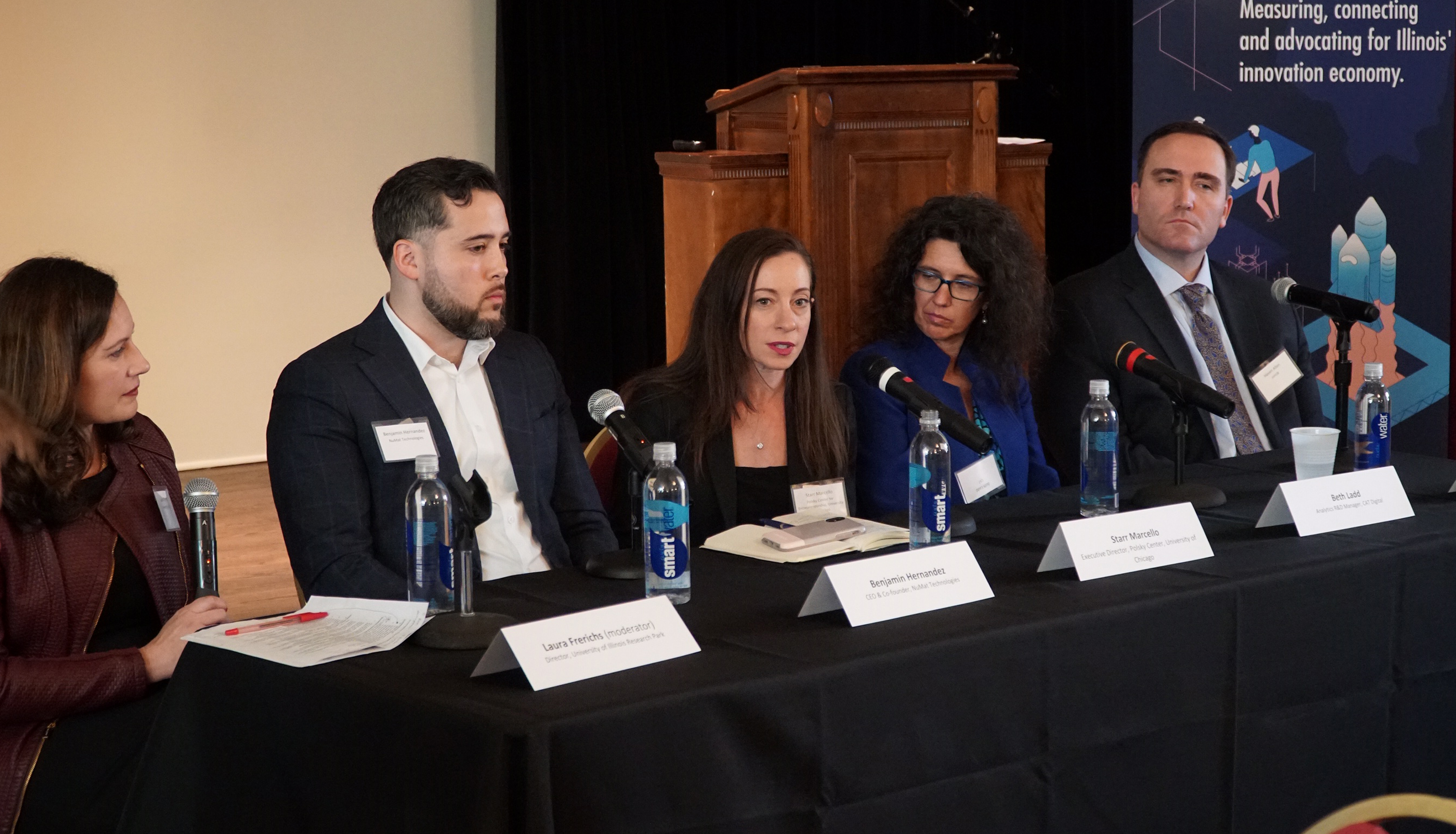
Innovation Day panel: Laura Frerichs, Director of the University of Illinois Research Park; Benjamin Hernandez, CEO & Co-founder of NuMat Technologies; Beth Ladd, Analytics R&D Manager at CAT Digital; and Starr Marcello, Executive Director of the Polsky Center at the University of Chicago
Cluster Roundtable
Facilitated by Ian Adams of CET and John Conrad of iBIO, the cluster strategies roundtable discussed the strengths and challenges facing cluster-based innovation.
- For deep-tech & science-based innovation, different sectors still have a lot in common and can benefit from similar resources and support.
- A policy priority for both iBIO and CET is to update the SBIR matching program for Illinois. The state currently pulls below its weight in SBIR funding received, ranking 13th nationally. Increasing the incentive to pursue SBIR funding will help growing companies bring innovative technologies to market in Illinois.
- While the specific sets of stakeholders may be different, both life sciences and cleantech folks noted that one gap is convening and helping corporates understand what’s going on in their own backyards is key to strengthening innovation within a cluster.
- One way the state could support industry innovation clusters is through sector specific industry committees coordinated by DCEO.
Place-based Innovation and Incubation Roundtable
Facilitated by Haven Allen of mHUB, Matthew Bragg of ISTC, and Starr Marcelo of UChicago’s Polsky Center, the place-based innovation and incubation focused on challenges surrounding diversity and inclusion in entrepreneurship, improved guidance for founders, and steps to take moving forward.
- To take on under-representation in entrepreneurship, the group discussed ongoing efforts aimed at addressing the issue, including UChicago Polsky’s Female Founder Meetups. Also discussed was UIUC’s AWARE program, which aims to increase the share of women applying for SBIR funding.
- To improve the quality of guidance provided to first-time founders and entrepreneurs, an apprenticeship-style program was proposed. The program would assist founders as the navigate the basics on starting a company, from legal formation to finding employees and scaling. An apprenticeship program could also assist first-time angel investors to help increase access to capital in the state.
- The group agreed that instead of funding additional physical spaces, state support should focus on programs—facilitated by existing spaces—that improve assistance provided to entrepreneurs and lower the bar to access for new founders.
STEM Talent Roundtable
Facilitated by Julia Kanouse, CEO of the Illinois Technology Association and Mark Harris of ISTC, the STEM talent roundtable stressed the importance of taking a comprehensive view in cultivating talent and starting to engage students at a young age.
- Part of the challenge—particularly in reaching girls and students of color—is that far too many students opt out of STEM and have difficulty identifying with those they see working in tech fields.
- Part of the solution the group discussed was not talking to students like parents do, often in a ‘fill in the blank’ way about what they profession they want to pursue. Instead of urging students into being an engineer, coder, or data scientist, we should focus on problems that need to be solved, allowing students to get excited about the application of technology, as opposed to a discipline or job. This will also help to demystify STEM careers and help students think about pathways for themselves with authentic connections to the real world.
- Also discussed was the importance of so-called soft skills (communication, team-building, problem solving) as a requisite for employability. These can be developed by providing students with opportunities to learn by doing in experiential environments.
- Roundtable participants shared a number of successful programs and models that should be shared and replicated to support industry engagement and entrepreneurial learning, such as Innovate Springfield’s high school program, the University of Illinois’ City Scholars Program, IMSA’s TALENT program, and ISTI’s STEM Challenge program.
Innovation Day Press
- Illinois Universities Are Producing More Startups Than Ever (ChicagoInno)
- Gov. Pritzker Celebrates Innovation Day (Illinois.gov)
- Pritzker names April 12 as ‘Innovation Day’ (WAND)
- Illinois Playbook (POLITICO)
- Innovation Day Proclamation

